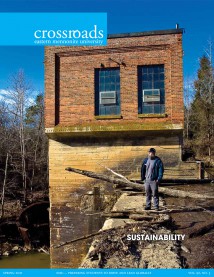These eight examples in three states show the range of agricultural work in which alumni are engaged – greenhouse operations, raising meat and poultry, dairy farming, marketing of produce, working the land as a form of rehabilitation.
Dawn ’91 and Troy (class of ’92) Alderfer raise corn, soybeans and wheat, dairy heifers and about 56,000 chickens on a 380-acre farm in Berks County, Pennsylvania. To minimize erosion and improve soil fertility, the Alderfers have used no-till practices on their fields since 1996, and are experimenting with winter cover crops. They also follow a voluntary nutrient management plan to control manure runoff, have planted trees around the chicken houses to act as odor buffers, and built fences along streams to keep their cattle from eroding the banks and polluting the water. In recognition of this work, the Alderfers have twice received the Tyson Foods Poultry Environmental Stewardship Award, been named Berks County Conservation District Outstanding Farmer of Year, and twice have been named runner-up for the US Poultry and Egg Association Family Farm Environmental Excellence Award.
Another poultry-farming couple, Linwood ’88 and Radella ’92 Vrolijk of Hinton, Virginia, has also been recognized for their farm’s environmental stewardship. The Vrolijks, who raise turkeys for the Virginia Poultry Growers Cooperative, received the 2009 Family Farm Stewardship Award from the Harrisonburg-Rockingham Chamber of Commerce.
The 2010 edition of that same award went to Philip ’94 and Terry ’94 Witmer, owners of Grazeland Dairy, a certified organic grazing dairy in Ottobine, Virginia. The Witmers, who have participated in several state and federal programs to encourage good environmental practices on their farm, also won a Clean Water Farm Award in 2006 from the Virginia Department of Conservation and Recreation. Two of Philip’s cousins are currently managing the farm, as the Witmers began a two-year service term in the fall of 2010 with Mennonite Mission Network and Virginia Mennonite Missions in La Mesa, Colombia.
At Tussock Sedge Farm in Bucks County, Pennsylvania, Henry ’70 and Charlotte ’65 Rosenberger have used conservation easements to preserve more than 420 acres of their land. The Rosenbergers, who raise grass-fed Red Angus beef cattle on terraced fields with no pesticides, herbicides or chemical fertilizers, earned the Heritage Conservancy’s 2010 Business Leader Conservation Award. Henry is currently chairman of the board of Living Hope Farm, a Community Supported Agriculture (CSA) program starting on a property owned by Franconia Mennonite Conference that will include an education center for children from Philadelphia to learn about food production.
Paul ’63 and Mary Ellen ’62 Lehman also raise grass-fed Angus beef cattle in Boswell, Pennsylvania, on a farm that’s been in Paul’s family for five generations. Earlier in life, Paul earned a PhD in plant pathology from North Carolina State University, then worked with the Brazilian Ministry of Agriculture on a soybean research project and spent 25 years researching alternatives to chemical pest and disease control with the Florida Department of Agriculture. Mary Ellen worked as a teacher. Upon their retirement in 2003, they moved to the farm and have been working at improved sustainability ever since. “What we have has been passed on to us from past generations, especially those who loved the this land,” Paul writes. “Our greatest reward is when the seventh generation of our family, our grandchildren, comes to enjoy the farm.”
Family farming also continues in Chesapeake, Virginia, where James Bergey ’05 raises peas, potatoes, tomatoes, sweet potatoes, sweet corn and other produce for sale at Bergey’s Breadbasket. His cousin, Laura Bergey ’07, grows additional produce like greens, squash and garlic for the store. James’ parents, Harold ’76, and Rose ’74 Bergey manage and work at Bergey’s Breadbasket – a bakery, deli, creamery and produce store. From 1930 to 2005, several generations of Bergeys ran a dairy on the same farm.
Marlene Boyer ’82 is president of Local Roots Market & Café in Wooster, Ohio. Local Roots operates as a cooperative business, open year-round as a market for local foods with a bakery and café. The coop’s goals are to “encourage healthy eating, expand local economic development, [and] promote community involvement and sustainable living.”
For several years, Dean Weaver ’89, Chris ’89 and Lynette ’88 Mast and Eugene ’68 and Gloria ’76 Diener have been supporters of, and volunteers at, Our Community Farm near New Market, Virginia. The farm is a Christian work-recovery community, providing a home where men and women can seek long-term recovery from addictive behaviors. In 2011, Our Community Farm began offering CSA shares for meat and produce. The alumni group has assisted with drafting a master plan for the 150-acre property, adding plans for sustainable timber harvest, firewood sales, field stone harvesting, rotational grazing, and solar irrigation systems for berry production to the current farming. Our Community Farm emerged from Our Community Place, a city-based nonprofit directed by Ron Copeland, MDiv ’06.
